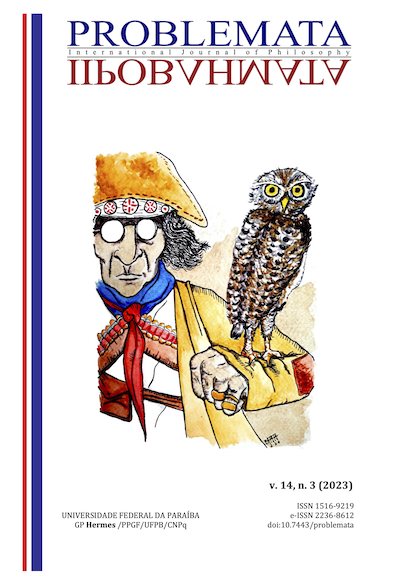MAN:
AN ENIGMA TO BE SOLID
DOI:
https://doi.org/10.7443/problemata.v14i3.67440Keywords:
Man, History of Ideas, ParadoxAbstract
This article addresses the problem of the human search for self-knowledge, knowledge of oneself. The same is considered by thinkers recognized as being the main task of philosophizing. Throughout the history of western thought this search represents a great challenge, as conditions for its realization change as we strive to achieve its purpose. From the moment it was set as a goal to be achieved this problem generated strong controversies regarding its viability. The approach proposed by Arthur Onken Lovejoy, in Reflections on human nature, and the perspective given by the history of ideas leads us to consider the hypothesis that it represents a form of paradox.
Downloads
References
AUSTIN, J.L. Philosophical Papers. Oxford: Clarendon Press. 1961.
CASSIRER, E. An essay on man: An introduction to a philosophy of human culture. Yale University Press, 1944.
CASSIRER, E. Antropologia Filosófica. Um ensaio sobre o homem: introdução a uma filosofia da cultura humana. Tradutor Vicente Felix de Queiroz. São Paulo: Editora Mestre Jou, 1972.
LOVEJOY, Arthur Onckhen. Reflections on human nature. Baltimore: The Johns Hopkins Press, 1961.
SCHELER, M. A situação do homem no cosmos. Tradução de Artur Morão. Lisboa: Edição texto & grafia, 2008.
SIBILIA, Paula. El hombre postorgánico: Cuerpo, subjectividade y tecnologias digitales. 1. ed. Buenos Aires: Fondo de Cultura Economica, 2005.
Downloads
Published
Issue
Section
License
Copyright (c) 2023 José Atílio Pires da Silveira

This work is licensed under a Creative Commons Attribution 4.0 International License.
Authors who publish with this journal agree to the following terms:
- Authors retain copyright and grant the journal right of first publication with the work simultaneously licensed under a Creative Commons Attribution License that allows others to share the work with an acknowledgement of the work's authorship and initial publication in this journal.
- Authors are able to enter into separate, additional contractual arrangements for the non-exclusive distribution of the journal's published version of the work (e.g., post it to an institutional repository or publish it in a book), with an acknowledgement of its initial publication in this journal.
-
- Authors are permitted and encouraged to post their work online (e.g., in institutional repositories or on their website) prior to and during the submission process, as it can lead to productive exchanges, as well as earlier and greater citation of published work (See The Effect of Open Access).





